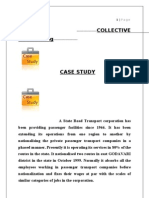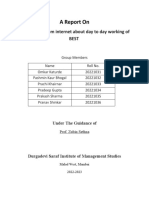Case - Grievance Procedure vs. Collective Bargaining
Case - Grievance Procedure vs. Collective Bargaining
Uploaded by
neetisomCopyright:
Available Formats
Case - Grievance Procedure vs. Collective Bargaining
Case - Grievance Procedure vs. Collective Bargaining
Uploaded by
neetisomOriginal Description:
Original Title
Copyright
Available Formats
Share this document
Did you find this document useful?
Is this content inappropriate?
Copyright:
Available Formats
Case - Grievance Procedure vs. Collective Bargaining
Case - Grievance Procedure vs. Collective Bargaining
Uploaded by
neetisomCopyright:
Available Formats
Case -grievance procedure vs.
collective bargaining
The Andhra pradsh state road transport corporation has been providing passanger
transportation facilities since 1956. It has been extending I operation from one
region to another by nationalizing the rprivate passenger transport companies in a
phased manner. Presentl it is operating its services in 80% of the routes in the state.
It nationalized two routes in east Godavari district in the state in October, 1988.
Normally it absorbs all the employees working in passenger transport companies
before nationalization and fix their wages at par with the scales of similar
categories of jobs.
The pay scales in the corporation are determined on the basis of mutual agreement
between the management and the recognized trade union. The scales are revised
once in three years. The recent agreement came into force with effect fron
septenber, 1988. There are two classes in the drivers’ category, i.e., class I (drvers
working on llong distance buses) and class II (drivers working on short distance
routes). The pay scales of class II drivers is enhanced from Rs. 600- 1200 to Rs.
900 – 1600.
The corporation absorbed 10 drivers who were with the private passenger transport
companies upon the recent nationalization of two routes. The personal department
fixed the scale of these 10 drivers in the scale of Rs. 600 – 1200 and it rejected
their plea of fixing their pay in the scale of RS. 900 – 1600 saying that only the
drivers drawing the scale of Rs. 600 – 1200 are eligible to draw the new scale of
Rs. 900 – 1600 . the corporation has set both the grievance machinery to resolve
employee problems. Then these drivers ubmitted this issue to the foreman who is
their immediate superior. The foreman told them to raise this issue in collective
bargaining with the help of trade union leaders as it is a policy issue. The trade
union leaders included this item in the draft agenda to the collective bargaining
committee to be held in January 1989. But the collective bargaining committee
deleted this iten frn the draft agenda saying that this issue can be settled through
grievance machinery as only 10 drivers out of 3000 drivers of the corporation are
concerned with this issue.
You might also like
- Case Study-Collective BargainingDocument3 pagesCase Study-Collective BargainingIshan PahujaNo ratings yet
- Sudha Industries LTDDocument4 pagesSudha Industries LTDAlka Jain100% (1)
- Case Study Collective BagainingDocument4 pagesCase Study Collective BagainingAlka JainNo ratings yet
- BMTC Case StudyDocument9 pagesBMTC Case StudyRanjith CL50% (2)
- Transport e PN 2018 19Document138 pagesTransport e PN 2018 19Ancy RajNo ratings yet
- Transport Department: Government of Tamil Nadu 2016Document40 pagesTransport Department: Government of Tamil Nadu 2016Ancy RajNo ratings yet
- Taxi Ride To Cost MoreDocument2 pagesTaxi Ride To Cost Moreegahmulia100% (2)
- Railway BudgetDocument14 pagesRailway Budgethar_thebestNo ratings yet
- Railway Budget For 2012Document2 pagesRailway Budget For 2012bankportalibpsNo ratings yet
- Transportation LawDocument15 pagesTransportation LawSHEKHAWAT FAMILYNo ratings yet
- Metro TrainDocument1 pageMetro TrainManiNo ratings yet
- PreciDocument1 pagePreciMuhammad AsjadNo ratings yet
- Railway Budget 2011-2012Document13 pagesRailway Budget 2011-2012Mohammed RiyasNo ratings yet
- Highlights of The Rail Budget 2013-14 As Presented by Railway Minister Mr. P.K. Bansal Relating To The Following Headings: ManufacturingDocument4 pagesHighlights of The Rail Budget 2013-14 As Presented by Railway Minister Mr. P.K. Bansal Relating To The Following Headings: ManufacturingPriyank SaxenaNo ratings yet
- CircularsDocument3 pagesCircularsmurali krishnaNo ratings yet
- Railway Budget by Mamta Banerjee 2010Document6 pagesRailway Budget by Mamta Banerjee 2010Niraj AgarwalNo ratings yet
- Torts ProjectDocument11 pagesTorts ProjectShalu MandiyaNo ratings yet
- Mariin Naming Binabalaan Ang Mga Na Sumunod Sa Sa Kanilang Operasyon. HuwagDocument2 pagesMariin Naming Binabalaan Ang Mga Na Sumunod Sa Sa Kanilang Operasyon. HuwagMacki CzedrickNo ratings yet
- English Version of Salient Points of Statement On Welcoming Modi Government's Second Railway Budget 2016 by BJP National President, Shri Amit ShahDocument9 pagesEnglish Version of Salient Points of Statement On Welcoming Modi Government's Second Railway Budget 2016 by BJP National President, Shri Amit ShahAmit ShahNo ratings yet
- Key Highlights of Railway Budget: Compiled by Anubandhan PattnaikDocument4 pagesKey Highlights of Railway Budget: Compiled by Anubandhan PattnaikShivani PradhanNo ratings yet
- Transport Management Chapter 3 & 4Document28 pagesTransport Management Chapter 3 & 4sajalgayan3No ratings yet
- Railway Budget 2010Document8 pagesRailway Budget 2010jubin654No ratings yet
- Bus Karo - Case Study 5Document5 pagesBus Karo - Case Study 5torqtechNo ratings yet
- The Future of Online Taxi in IndonesiaDocument1 pageThe Future of Online Taxi in IndonesiameeawulanNo ratings yet
- Best UndertakingDocument27 pagesBest UndertakingRohan TrivediNo ratings yet
- MSRTC Public UtilityDocument52 pagesMSRTC Public UtilityNeelima Deshpande0% (1)
- Rail Budget 2015 16 Highlights PDFDocument8 pagesRail Budget 2015 16 Highlights PDFSelvaraj VillyNo ratings yet
- Print Release1Document2 pagesPrint Release1rajendrasgadviNo ratings yet
- 09.railway Budget - 2011 HighlitsDocument5 pages09.railway Budget - 2011 HighlitsPrashanth RajuNo ratings yet
- Transportation Law Project (Raj Vardhan Agarwal) BBA - LLB (H) 8th SemesterDocument14 pagesTransportation Law Project (Raj Vardhan Agarwal) BBA - LLB (H) 8th Semesterraj vardhan agarwalNo ratings yet
- IOS Project 1296Document7 pagesIOS Project 1296Aditya PrakashNo ratings yet
- Comparative Study On Usage of Commercial Vehicles "Best" and Indian Railways''Document116 pagesComparative Study On Usage of Commercial Vehicles "Best" and Indian Railways''rahuln181No ratings yet
- Ken Research Case Study 2Document1 pageKen Research Case Study 2Palak Roy ChowdhuryNo ratings yet
- High Speed Travel in Indian Railways - PIBDocument3 pagesHigh Speed Travel in Indian Railways - PIBnakul4948No ratings yet
- NR #2411B, 05.21.2011, Compensation, Bus DriverDocument2 pagesNR #2411B, 05.21.2011, Compensation, Bus Driverpribhor2No ratings yet
- Konkan RailwaysDocument11 pagesKonkan RailwaysSandeshChandrashekarNo ratings yet
- Initiatives by Indian Railways: Corporate Social ResponsibilityDocument38 pagesInitiatives by Indian Railways: Corporate Social Responsibilityrk_dharmani5305No ratings yet
- Complaint HandlingDocument6 pagesComplaint HandlingIka ChillayNo ratings yet
- Education in KeralaDocument5 pagesEducation in KeralaBharathi MariappanNo ratings yet
- Indian RailwaysDocument3 pagesIndian Railwaysyogeshjain18No ratings yet
- Focus Group DiscussionDocument4 pagesFocus Group DiscussionUsman LatifNo ratings yet
- 2 NDDocument15 pages2 NDvvasani_1No ratings yet
- Indian Railway Swot AnalysisDocument5 pagesIndian Railway Swot AnalysisSaurabh Kumar Tiwari0% (1)
- State Transport Undertakings in India: Status and IssuesDocument20 pagesState Transport Undertakings in India: Status and IssuesVenkata SubhashNo ratings yet
- Impact of Privatisation On RailwaysDocument9 pagesImpact of Privatisation On RailwaystejasNo ratings yet
- Railway MonopolyDocument3 pagesRailway Monopolypjs_canNo ratings yet
- Rail BudgetDocument3 pagesRail Budgetnikhil_mehra_1No ratings yet
- Railway Budget 2012 951624aDocument1 pageRailway Budget 2012 951624aJatin BishtNo ratings yet
- Janata Dal CaseDocument11 pagesJanata Dal CaseUttamNo ratings yet
- Indian Railway Budget: A Brief SummaryDocument4 pagesIndian Railway Budget: A Brief SummaryprasannamrudulaNo ratings yet
- In Re Opta Cabs PVT LTD 27072018 Authority For AAR201807091816055910COM996748Document3 pagesIn Re Opta Cabs PVT LTD 27072018 Authority For AAR201807091816055910COM996748surajdbranluNo ratings yet
- Pakistan Railways Is A Department of The Government of PakistanDocument10 pagesPakistan Railways Is A Department of The Government of PakistanMaheen KasiNo ratings yet
- Public Transportation 2.0Document3 pagesPublic Transportation 2.0Rajesh KhadkaNo ratings yet
- The Motor Vehicles (Amendment) Bill, 2019Document4 pagesThe Motor Vehicles (Amendment) Bill, 2019owaisNo ratings yet
- Uttar Pradesh State Road Transport CorporationDocument4 pagesUttar Pradesh State Road Transport CorporationShubham BansalNo ratings yet
- Background of The CompanyDocument31 pagesBackground of The CompanypuneetNo ratings yet
- Day To Day Working of BESTDocument6 pagesDay To Day Working of BESTSourabh RaoraneNo ratings yet
- Supply Chain Management at Dalmia Cement LTD: Case Analysis-Group 23Document5 pagesSupply Chain Management at Dalmia Cement LTD: Case Analysis-Group 23Avinash ShanubhogueNo ratings yet
- App Auto Fare Suggestions 151122Document1 pageApp Auto Fare Suggestions 151122SatyaNo ratings yet
- Myanmar Transport Sector Policy NotesFrom EverandMyanmar Transport Sector Policy NotesRating: 3 out of 5 stars3/5 (1)



























































